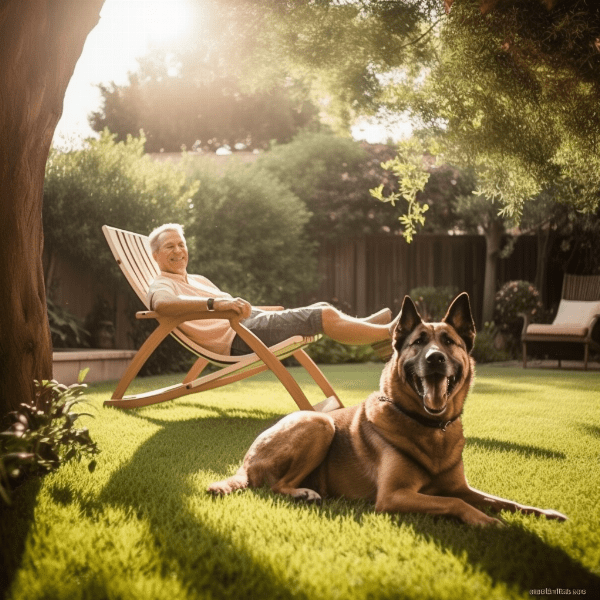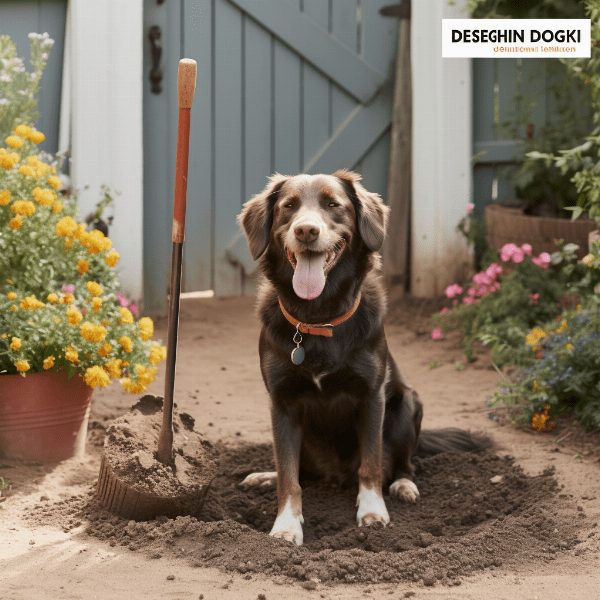Table of Contents
- Understanding Why Dogs Dig
- Providing Enough Exercise and Mental Stimulation
- Creating a Designated Digging Area
- Using Deterrents to Discourage Digging
- Ensuring Proper Nutrition and Hydration
- Avoiding Leaving Your Dog Alone for Long Periods
- Properly Training and Socializing Your Dog
- Seeking Professional Help If the Behavior Persists
- Repairing and Filling Holes
- Conclusion: Enjoying Your Yard with a Dig-Free Dog
Understanding Why Dogs Dig
Understanding why dogs dig is the first step to preventing this behavior. While it may seem destructive and frustrating to us, digging is a natural behavior for dogs that serves several purposes.
Seeking Comfort and Coolness
Dogs may dig to create a comfortable spot to lie down in or to cool off on a hot day. If your dog is digging under a tree or in a shaded area, they may be trying to create a cooler spot to relax in.
Burying Objects
Dogs may also dig to bury bones, toys, or other objects. This behavior is instinctual and goes back to their days as wild animals, when they would bury food to save it for later.
Escaping or Seeking Attention
In some cases, dogs may dig to escape from their yard or to get attention from their owners. If your dog is digging near the fence, they may be trying to find a way to escape or simply trying to get a better view of the outside world.
Anxiety or Boredom
Dogs that are anxious or bored may also resort to digging as a coping mechanism. This behavior can be a sign of underlying anxiety or stress and should be addressed through proper training and mental stimulation.
By understanding why your dog is digging, you can take steps to prevent this behavior and ensure they are happy and healthy.
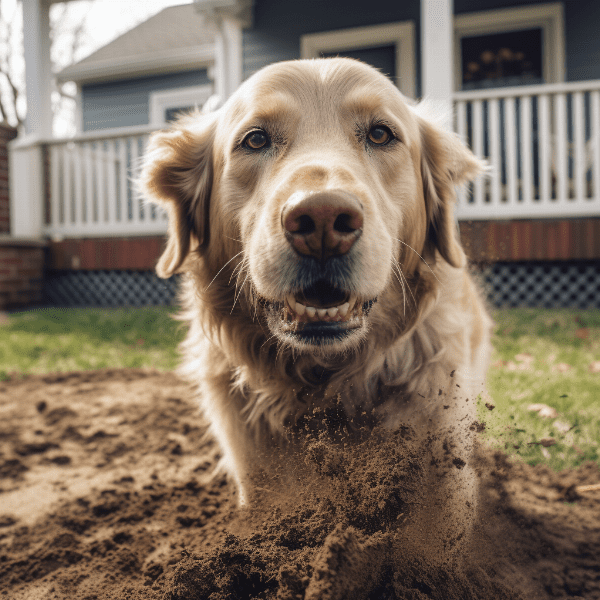
Providing Enough Exercise and Mental Stimulation
One of the most effective ways to prevent your dog from digging is to make sure they are getting enough exercise and mental stimulation. A tired and mentally stimulated dog is less likely to resort to destructive behaviors like digging.
Exercise
Regular exercise is essential for dogs to maintain good physical and mental health. Depending on their breed and age, dogs require varying amounts of exercise. For example, high-energy breeds like Border Collies and German Shepherds need more exercise than low-energy breeds like Bulldogs and Basset Hounds.
You can provide exercise for your dog in various ways, including daily walks, runs, hikes, or playtime in the yard. You can also enroll your dog in obedience or agility training, which provides both physical and mental stimulation.
Mental Stimulation
Mental stimulation is just as important as physical exercise for dogs. Without it, dogs can become bored and resort to destructive behaviors like digging. You can provide mental stimulation for your dog through interactive toys, puzzle feeders, or training sessions that involve learning new commands or tricks.
Another way to provide mental stimulation for your dog is to take them on walks in new and unfamiliar environments. This exposes them to new sights, sounds, and smells, which can be mentally stimulating.
By providing enough exercise and mental stimulation, you can help prevent your dog from digging and ensure they are happy and healthy.

Creating a Designated Digging Area
If your dog loves to dig, creating a designated digging area can be an effective way to redirect this behavior and protect your yard. By providing a space for your dog to dig, you can encourage them to use that area instead of digging in other parts of your yard.
Choose the Right Spot
When choosing a spot for your dog’s designated digging area, consider factors like sun exposure and soil type. Dogs often prefer to dig in soft and cool soil, so a shaded area with loose soil may be the ideal location.
Make It Attractive
To encourage your dog to use their designated digging area, make it attractive and appealing to them. You can bury toys or treats in the area, or sprinkle a small amount of their favorite scent, like lavender or mint, to entice them to dig.
Train Your Dog
Training your dog to use their designated digging area is important. You can start by praising and rewarding them when they dig in the designated area, and redirecting them to that area if they start to dig elsewhere in your yard. Consistency and positive reinforcement are key to successfully training your dog.
Maintenance
It’s important to maintain your dog’s designated digging area to keep it fresh and appealing. This may involve regularly adding new toys or treats, or refreshing the scent in the area. You should also monitor the area for any signs of digging outside of the designated area and redirect your dog as needed.
By creating a designated digging area, you can protect your yard and provide an outlet for your dog’s natural digging behavior.
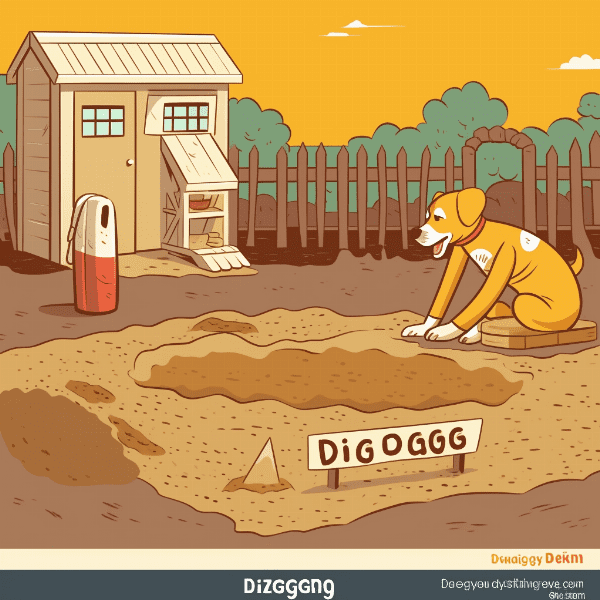
Using Deterrents to Discourage Digging
If your dog is persistently digging in areas of your yard where they shouldn’t, it may be necessary to use deterrents to discourage this behavior.
Physical Barriers
Physical barriers can be effective in preventing your dog from accessing areas where they are digging. You can use materials like chicken wire or fencing to block off areas of your yard where your dog is prone to dig. You can also consider using large rocks or planters to create a barrier around flower beds or other areas where your dog may dig.
Deterrent Sprays
There are several types of deterrent sprays available on the market that can be sprayed on areas of your yard to discourage digging. These sprays typically contain a strong scent or taste that is unpleasant to dogs. You can also make your own deterrent spray using ingredients like vinegar, cayenne pepper, or citrus.
Ultrasonic Devices
Ultrasonic devices emit a high-pitched sound that is unpleasant to dogs and can discourage them from digging in certain areas. These devices are often motion-activated and can be placed in areas where your dog is prone to dig.
Positive Reinforcement
In addition to using deterrents, positive reinforcement can also be an effective way to discourage digging. You can praise and reward your dog when they refrain from digging in certain areas, or when they use their designated digging area.
By using deterrents and positive reinforcement, you can discourage your dog from digging in areas where they shouldn’t and encourage them to use their designated digging area instead.

Ensuring Proper Nutrition and Hydration
Proper nutrition and hydration are essential for your dog’s overall health and can also play a role in preventing unwanted behaviors like digging.
Provide Fresh Water
Make sure your dog has access to fresh water at all times, especially during hot weather when they may be more prone to digging to find a cool spot to lie down. Dehydration can cause your dog to become restless and anxious, which can lead to destructive behaviors like digging.
Feed a Balanced Diet
Feeding your dog a balanced diet is important for their physical and mental health. A diet that is high in carbohydrates and low in protein can cause your dog to become restless and anxious, which can lead to destructive behaviors like digging. Consider feeding your dog a high-quality dog food that is appropriate for their age, breed, and activity level.
Avoid Overfeeding
Overfeeding your dog can lead to obesity and other health problems, which can cause them to become less active and more prone to destructive behaviors like digging. Make sure to measure your dog’s food and avoid giving them too many treats or table scraps.
Consult with Your Veterinarian
If your dog is persistently digging, it may be a sign of an underlying health issue or behavioral problem. Consult with your veterinarian to rule out any medical conditions and to discuss appropriate treatment options.
By ensuring proper nutrition and hydration, you can help prevent unwanted behaviors like digging and ensure your dog is healthy and happy.

Avoiding Leaving Your Dog Alone for Long Periods
Arrange for Regular Exercise and Potty Breaks
If you know you will be away from home for an extended period, arrange for someone to provide your dog with regular exercise and potty breaks. You can hire a dog walker or pet sitter, or ask a friend or family member to help out.
Provide Plenty of Toys and Mental Stimulation
To keep your dog occupied and prevent boredom while you’re away, provide them with plenty of toys and mental stimulation. Puzzle feeders, chew toys, and interactive toys can all provide your dog with mental stimulation and keep them occupied while you’re away.
Consider Crate Training
Crate training can be a useful tool for preventing unwanted behaviors like digging while you’re away from home. Make sure to choose a crate that is appropriately sized for your dog and provide them with comfortable bedding and toys to keep them occupied.
Gradually Increase Alone Time
If your dog is not used to being alone for long periods, gradually increasing their alone time can help prevent anxiety and destructive behaviors like digging. Start by leaving them alone for short periods and gradually increase the amount of time they are alone.
By avoiding leaving your dog alone for long periods, you can prevent boredom and anxiety, which can lead to destructive behaviors like digging.

Properly Training and Socializing Your Dog
Proper training and socialization are key to preventing unwanted behaviors like digging in dogs. A well-trained and socialized dog is more likely to follow commands and behave appropriately in various situations.
Basic Training
Basic obedience training is important for all dogs, regardless of their age or breed. Teaching your dog basic commands like “sit,” “stay,” and “come” can help prevent unwanted behaviors like digging. Consistent and positive reinforcement is key to successful training.
Addressing Behavior Problems
If your dog is persistently digging despite your efforts to prevent it, it may be a sign of an underlying behavior problem. Consider working with a professional dog trainer or behaviorist to address the issue and develop a personalized training plan.
Socialization
Socialization is important for all dogs to ensure they are comfortable around people and other animals. Proper socialization can help prevent anxiety and other behavioral problems. Socialization should begin when your dog is young and continue throughout their life.
Expose Your Dog to Various Situations
To properly socialize your dog, expose them to various situations and environments. Take them to the park, to dog-friendly cafes, and to social events with other dogs. This exposure can help prevent anxiety and other behavioral problems.
By properly training and socializing your dog, you can prevent unwanted behaviors like digging and ensure they are happy and well-behaved in various situations.
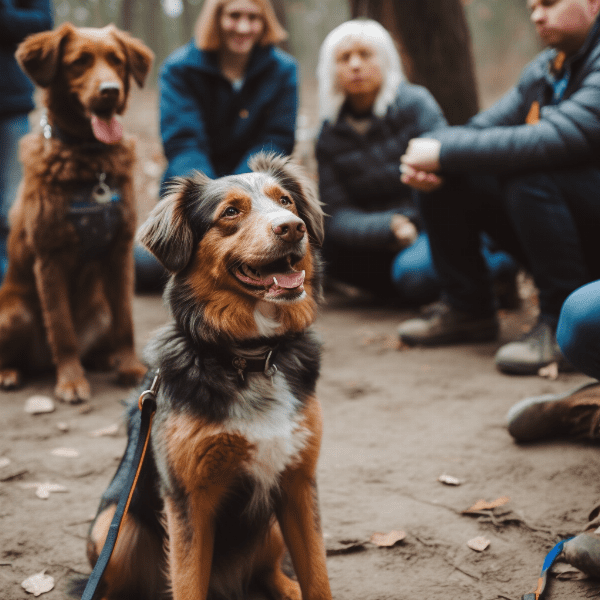
Seeking Professional Help If the Behavior Persists
If despite your efforts, your dog continues to dig persistently, it may be time to seek professional help. A professional dog trainer or behaviorist can help identify the underlying cause of the digging and develop a personalized training plan to address the behavior.
Identifying Underlying Causes
Professional dog trainers and behaviorists can help identify underlying causes of the digging behavior. This may include anxiety, boredom, or a lack of proper exercise or mental stimulation. By identifying the underlying cause, the trainer can develop a personalized training plan to address the behavior.
Developing a Personalized Training Plan
Once the underlying cause has been identified, the trainer can develop a personalized training plan to address the digging behavior. This may involve a combination of techniques, such as positive reinforcement training, crate training, or the use of deterrents.
Consistent and Positive Reinforcement
Consistency and positive reinforcement are key to successfully addressing any unwanted behavior in dogs, including digging. The trainer will work with you to ensure you are using consistent and positive reinforcement techniques to discourage digging and promote positive behaviors.
Medication
In some cases, medication may be necessary to address underlying behavioral problems that are causing the digging behavior. A professional behaviorist or veterinarian can provide guidance on the use of medication as part of a comprehensive treatment plan.
By seeking professional help, you can address the digging behavior and ensure your dog is happy and well-behaved.
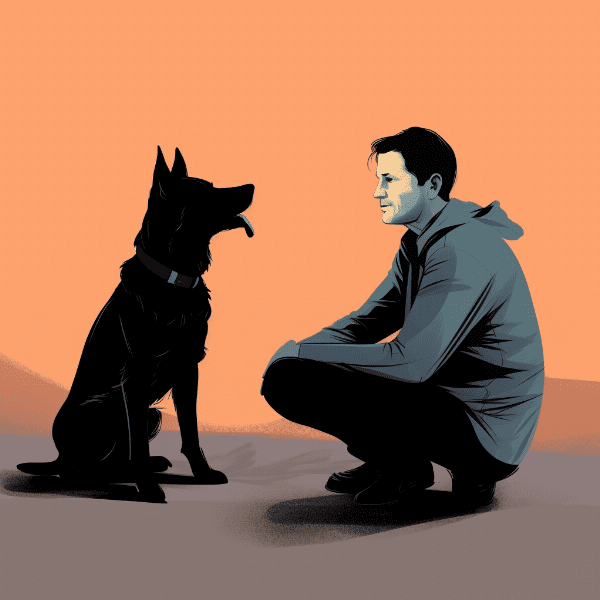
Repairing and Filling Holes
Safety First
Before repairing and filling any holes, make sure the area is safe and free from any hazards like rocks or broken glass that could harm your dog. Make sure the soil is level and stable before filling the hole.
Filling the Hole
To fill the hole, use a mixture of soil and sand to create a stable and level surface. Pack the soil mixture tightly to prevent further digging in the area.
Deterrents
To prevent your dog from digging in the same area, consider using deterrents like cayenne pepper, vinegar, or citrus in the area. You can also place large rocks or planters in the area to create a barrier.
Monitoring and Training
It’s important to monitor your dog and train them to avoid digging in the repaired area. Praise and reward your dog when they avoid digging in the area and redirect them to their designated digging area if needed.
Repeat as Necessary
If your dog continues to dig in the same area, repeat the filling and deterrent process until the behavior is discouraged.
By repairing and filling holes, you can prevent further damage to your yard and promote a safe environment for your dog.
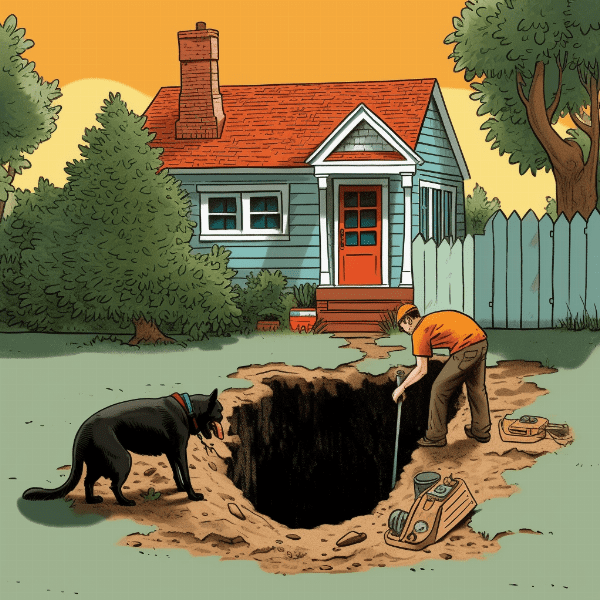
Conclusion: Enjoying Your Yard with a Dig-Free Dog
Digging is a natural behavior for dogs, but it can cause damage to your yard and be frustrating for dog owners. However, by understanding why dogs dig and taking proactive steps to prevent it, you can enjoy your yard with a dig-free dog.
Prevention is Key
Preventing unwanted digging behavior in dogs is much easier than trying to correct it later. By providing enough exercise and mental stimulation, creating a designated digging area, using deterrents, and ensuring proper nutrition and hydration, you can help prevent your dog from digging in unwanted areas.
Proper Training and Socialization
Proper training and socialization are also important in preventing unwanted behaviors like digging. By addressing any underlying behavioral problems and providing consistent and positive reinforcement training, you can ensure your dog is well-behaved in various situations.
Seeking Professional Help
If the digging behavior persists despite your efforts, seeking professional help from a dog trainer or behaviorist can be beneficial in identifying the underlying cause and developing a personalized training plan.
By following these tips, you can enjoy your yard with a dig-free dog and ensure your furry friend is happy and healthy. Remember, prevention is key, and by taking proactive steps, you can prevent unwanted behaviors like digging and enjoy your time with your dog in your beautiful yard.
